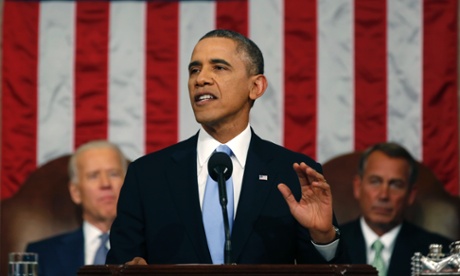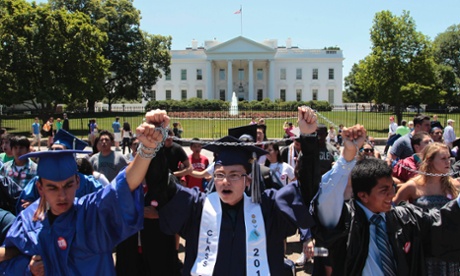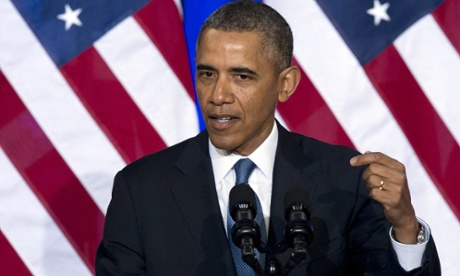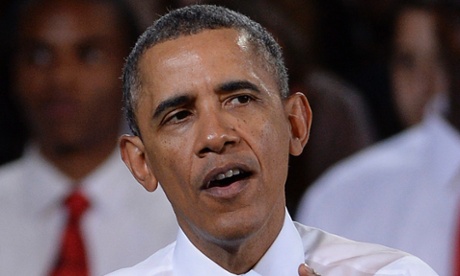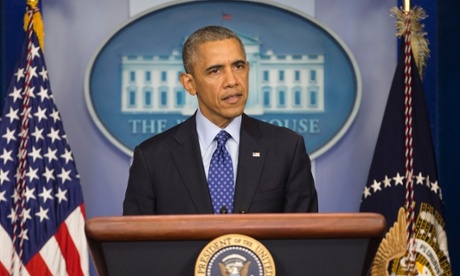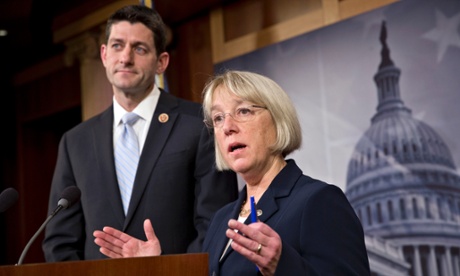When US lawmakers left Washington DC for a five-week long congressional recess late last week, a frustrated Barack Obama said he was left to “act alone” on immigration.
But the president’s immigration battle has two fronts: the growing humanitarian crisis at the US-Mexico border, where more than 57,000 Central American children have arrived unaccompanied, and mounting pressure for reform from the more than 11 million undocumented people who live, work and raise families in the United States.
“I don’t think the president has any option but to do something that is bold, and big and our community will judge him based on the scope of that,” said Lorella Praeli, the advocacy and policy director for United We Dream, a pro-immigration reform group, during a conference call with reporters on Thursday.
In a dizzying finale before the recess, House Republicans eked out the votes to pass two bills – neither of which have a realistic chance of becoming law – that aim to address the crisis at the US’s southern border. One measure would scale back the Obama’s deferred action program for young immigrants, a hallmark of the president’s record on immigration.
Frank Sharry, executive director of America’s Voice, an immigration advocacy group, said during the call that Congress’ refusal to pass immigration reform gives president “sole responsibility” to act, adding that the gridlock provides a pathway for the president “to go big on administrative action”.
Big or small, probable or not, here are some of the actions the president could consider.
Expanding Deferred Action for Childhood Arrivals (Daca)
Advocates and lawmakers in touch with White House officials have spread the word that the administration is planning to “grant work permits” to millions of the more than 11 million immigrants living in the country illegally, the Associated Press reported.
Such reports have led to speculation that the president will expand the deferred action program, a 2012 executive order known by its acronym, Daca. This program delays deportations for immigrants known as Dreamers, young people who were brought to the US without documentation as children and meet certain requirements.
But on Sunday, White House senior adviser Dan Pfeiffer brushed off the reports as “uninformed speculation” during an interview on ABC’s political affairs show, This Week with George Stephanopoulos.
Pfeiffer said the president is waiting for Attorney General Eric Holder and Department of Homeland Security (DHS) secretary Jeh Johnson to present him with their recommendations, which are expected by the end of summer.
With that caveat, there are a few ways the president could go about expanding Daca.
One idea that’s been floated is to offer temporary legal status to the family members of the young immigrants eligible to legally stay and work in the US under the Daca program. It’s unclear how many people this would impact. So far, more than 550,000 young people have been approved for deferred action under the program, according to government data.
On a grander scale, the president could offer temporary protected status to parents and legal guardians of US citizens. Again, it’s hard to pin down how many people this might affect. A 2009 analysis by Pew Research’s Hispanic Trends Project found that 3.8 million immigrant parents living in mixed-status families in the US could be eligible under such a program.
Pathway to citizenship
In an ideal world for immigration-reform advocates, Obama would make deferred-action available to anyone who would have been eligible under a bipartisan immigration bill that passed the Senate in 2013 and has languished in the House with little hope of getting a vote.
This historic legislation would have overhauled the US legal immigration and offered a path toward citizenship for up to 8.3 million individuals, according to an estimate by the nonpartisan Congressional Budget Office. Under this bill, individuals would be eligible for legalization if they had entered the US before January 2012 and had no felony convictions, among other requirements.
But advocates crossing their fingers for such a sweeping order will most likely be disappointed. Obama apparently told advocates to “right size” expectations during a meeting with stakeholders last month, the AP reported.
New criteria for deportations
In the face of increasing pressure from immigration-reform advocates frustrated with the president’s record on deportations and political inaction in Congress, Obama asked the DHS secretary to review the country’s law enforcement policies governing deportations.
At the time, Obama expressed concern over the way deportations affect mixed-status families. A White House statement released after the president met with Latino lawmakers in March, said: “The president emphasised his deep concern about the pain too many families feel from the separation that comes from our broken immigration system.”
For this reason, many expect the Obama administration to come out with a new protocol for deportations.
Kamal Essaheb, an immigration policy attorney at the National Immigration Law Center, said advocates are calling for DHS to use prosecutorial discretion, and to consider mitigating factors such as family ties before deporting someone.
Essaheb said advocates also want to see other administrative remedies such as ensuring immigrants have the opportunity to have their cases heard in court, and guaranteeing accountability for immigration enforcement sectors that don’t follow procedure, which has caused issues in the past.
Parole in place
Another option at the president’s disposal is parole in place. This administrative tool could enable certain immigrants living in the US unlawfully to remain in the country while they apply for a change of status. Effectively, unlawful entry would not preclude an immigrant from applying for a status adjustment.
“Parole in place is one example of existing authority that could be used more aggressively to help some people get on a path to citizenship,” said Yale Law School professor Michael Wishnie. But he said other strategies would be needed for the people who aren’t eligible.
A report by the Center for American Progress says that this mechanism has typically been used on a case-by-case basis and would not be a great option for issuing broad reforms. The report also notes that this approach is not presently used for people who overstay their visas, roughly 40% of the US’s undocumented population.
Country-specific approach
Under an administrative tool called deferred enforced departure, the president could protect nationals of a specific country from removal, typically for a designated period of time. In this past, this approach has been applied for nationals from countries dealing with natural disasters, civil unrest or war, for example.
Wishnie said he believes the president would be justified in using this authority to defer the removal of children fleeing grave violence in Central America’s northern triangle of Honduras, Guatemala and El Salvador.
“If [Obama] were to use that country-specific authority for particular countries on particular grounds, it would not be a stretch,” Wishnie said. “But he couldn’t get everybody covered that way. That’s why he needs to knit together a bunch of different strategies.”



